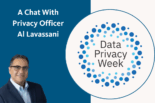By the UC Campus Privacy Officials. Privacy advocates encourage bringing privacy awareness into the higher ed classroom. Privacy is, after all, an interdisciplinary affair, and it impacts everyone. One simple way of introducing the privacy dialogue into the classroom is to develop a privacy statement for your course syllabus. As faculty and instructors finalize their syllabi for the new term, they can consider adding a statement explaining expectations and obligations related to privacy and confidentiality.
The University of California Campus Privacy Officials recommend the following tips for those who wish to begin the privacy dialogue with their students. Included below is a model privacy statement for instructors to adapt to their courses. We welcome your feedback and encourage you to contact your local Campus Privacy Officer.
Why Is Privacy Important?
Privacy is the ability to exercise agency and control over oneself and one’s body, space, communications, and personal data. It is fundamental to the rights of free speech, inquiry, and thought. In the modern tech-driven, data-informed world, privacy is often viewed as increasingly endangered even as more laws are passed regulating data privacy. Data and privacy literacy currently have niche audiences but lack broader social awareness. A modern university education should include robust dialogue around privacy and data protection.
What Is a Privacy Statement?
A helpful privacy statement:
- Establishes the fundamental right of everyone in your class to decide how much and what to share
- Explains what privacy expectations students have in your class
- Explains what privacy rights and obligations students and instructors have in your class
- Provides resources for further inquiry
What are some initial considerations for the privacy statement?
- Consider the modality of the course (e.g., online, in-person) and whether the course will be recorded. Each may pose different privacy issues.
- Will students be exposed to other students’ works (e.g., group projects, peer review)? Or is the course primarily lectures and individual work?
- Will any exams be proctored online? (Note: Not all campuses allow online exam proctoring. Requiring students to turn on their camera to be watched or recorded at home during an exam poses significant privacy concerns and should not be undertaken lightly. Several proctoring services use machine learning, AI, eye-tracking, key-logging, and other technologies to detect unusual behavior. All campuses recommend considering other types of assessments that are less privacy invasive.)
- Consider whether and how the instructor will use metadata, usage logs, or transactional information (e.g., LMS analytics) from platforms used in the course.
- Does the course cover sensitive topics or ask the student to share potentially sensitive experiences?
- Are visitors allowed to attend lectures or view recordings (e.g., prospective students auditing a class session)?
Model Privacy Statement
The model privacy statement below can be customized for your specific needs. In this model, each component is part of a coherent whole. Instructors are free to reduce, adapt, or use it as best fits the course context, materials, and modality. You can consider using the two introductory paragraphs alone or in combination with any of the other relevant portions. Not all sections will be relevant to every course. You can also consider using the introductory section with a hyperlink to the remaining portions. Further training and support for instructors and students are available through your Campus Privacy Office.
Privacy Practices in this Course
This course is a community built on trust; as a learning community, we are collectively responsible for upholding privacy protections. In order to create a community built on trust and the most effective learning experience, our interactions, discussions, and course activities must remain private and free from external intrusion. We have obligations to each other to preserve privacy and cultivate fearless inquiry. We respect the individual dignity of all and will refrain from actions that diminish others’ ability to learn.
As your instructor, I am committed to protecting your privacy by only using university-approved course technologies and adhering to the Family Educational Rights and Privacy Act (FERPA) [link to your location’s FERPA notice] and Campus Privacy Office guidelines. This includes using your educational data only as allowed by FERPA, for example, for legitimate educational purposes such as submitting your final grades to the registrar’s office. Communications in this course are subject to the UC Principles of Community and the Electronic Communications Policy.
Please note the following privacy practices for our course:
Course platform. This course uses [indicate the platform, e.g., Canvas, Blackboard], which collects information about your engagement with course materials. I will review this information periodically to ensure students are engaged and look for signs of students falling behind. I will also review this information in case of academic misconduct allegations, if relevant.
Online/video classes. Regarding video-conferencing, while I ask, to the extent you are comfortable and able, that you keep your videos on during lessons to aid in the development of our learning community, I also understand that may not always be possible. Know that you will not be penalized for choosing to disable your video during synchronous course sessions. You are welcome to use an appropriate virtual background if you do not want to have your surroundings visible. Be mindful of others who may not wish to be visible or recorded in the background.
You may use your name or a pseudonym on [identify the video platform, e.g., Zoom]; pseudonyms may only be used on this platform with my prior approval. Students with an official FERPA block on directory information with the registrar are not required to use their name or camera during online classes.
Also, while I do not plan on recording our course sessions, if a need to record our class arises, I will give everyone notice prior to the recording, so that you may turn off your video should you not wish to be recorded.
Online proctoring. We will use an online proctoring service for our class. This will require you to take your online exam(s) with live video showing you and your surroundings. The technology will monitor you during the exam for unusual or unexpected behaviors indicating academic dishonesty. [If the platform uses AI, facial recognition, key-logging, or other similar technology to detect abnormal behavior, list that as well. List any available alternatives for anyone who objects, such as oral exam, group project, in-person proctoring, inability to enroll in the class, etc. Note: Not all campuses allow online exam proctoring. All campuses recommend considering other types of assessments that are less privacy-invasive.]
Using learning materials. Course materials (videos, assignments, problem sets, etc.) are for use in this course only. You may not upload them to external sites, share with students outside of this course, or post them for public commentary without my written permission. We will not pin or take screenshots of fellow classmates or record sessions during synchronous online sessions or share discussion thread posts from the learning management system unless granted explicit permission to do so. Unauthorized sharing or uploading to exam questions, test answers, or summaries of exams is prohibited.
Using live class recordings. We are recording class meetings to support remote students and to provide everyone in the class with useful study aids. These recordings will be available for review through our learning management system [identify the LMS, e.g., Canvas, Blackboard]. Students are prohibited from recording the class themselves unless a student has an approved academic accommodation for such recording. The university strictly prohibits anyone from duplicating, downloading, or sharing live class recordings with anyone outside of this course, for any reason.
Sharing student information. You may work on group projects with other students or be asked to review or respond to their work. Other materials and activities may provoke debate, argument, or spirited discussion; some of us may volunteer sensitive personal information. Do not share others’ personal information, including class dialogue or performance, on sensitive topics outside of our course community. Student work, discussion posts, and all other forms of student information related to this course should be handled with respect and remain within interactions of this course. You may publicly post your own work, provided it does not violate academic dishonesty policies or show responses to assessments; public posting of group work requires consent from all group members. Research conducted as part of a class is subject to UC research policies and may include sensitive information. Students may not share research information without permission from the instructor.
Sharing course information with others. Do not post images or identifiable conversations that occur in class to social media or to those beyond our learning community. Sharing private information about our course community (including discussions, activities, presentations, student work, etc.) with others for the purpose of inviting external attention, intrusion, ridicule, or harassment is an egregious breach of trust. Violating these principles will be handled according to the [link to applicable academic honor code].
Questions and resources. Finally, I encourage you to become active agents in understanding how your personal data is used and protected by the university. Answer the following questions (credited to A. Caines and E. Glass, “Education before Regulation: Empowering Students to Question Their Data Privacy,” EDUCAUSE 2019) to better understand how and why your data is collected, the potential risks of this collection, and how to better protect your personal data:
- What types of personal data do you think are collected through your use of digital tools for educational activities?
- Which of your university-affiliated daily activities collect personal data about you? Why?
- What value does your personal data have for different contexts and entities? Consider how your data might be valued by your instructor, the institution, yourself, companies, and bad actors.
- Who owns your personal data, who can sell it, and who can use it for what purpose?
- Are there aspects of your identity or life that you feel would put you in a place of special vulnerability if certain data were known about you or used against you?
If you have concerns after reviewing these privacy practices and asking yourself these questions, I invite you to reach out to me or our campus privacy officer [provide CPO email] to discuss them. I also encourage you to learn more about privacy by visiting [provide privacy office website].
This article was written by the UC Campus Privacy Officials, with thanks to the University of Notre Dame and Carrie Klein of George Mason University for their syllabus language.







